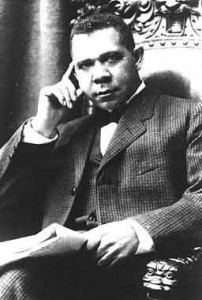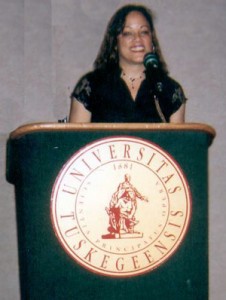“The highest test of the civilization of any race is in its willingness to extend a helping hand to the less fortunate. A race, like an individual, lifts itself up by lifting others up.” — Booker T. Washington
I became reacquainted with the legacy of Booker T. Washington a few years ago when I received a call from his great granddaughter, Sarah O’Neal Rush. Sarah is an educator and counselor who is also the founder and executive director of the Booker T. Washington Empowerment Network (BTWEN). Sarah works primarily with “at risk” youth in East Oakland California.
from his great granddaughter, Sarah O’Neal Rush. Sarah is an educator and counselor who is also the founder and executive director of the Booker T. Washington Empowerment Network (BTWEN). Sarah works primarily with “at risk” youth in East Oakland California.
When she called me, she had been asked to give a speech at the 150th birthday tribute to her great grandfather. It was a high stakes presentation; she was anxious and she wanted to do a great job. I was more than willing to help her prepare.
Working with Sarah was like stepping back in time. The story she told took place deep in the annals of African American history. In the process of developing her speech, she told me about her great grandfather’s many accomplishments and contributions. I learned that Booker T. Washington was an extraordinary man.
The Real Booker T. Washington
Though the term “at risk youth” did not exist during the time Booker T. Washington lived, you could say that given his extreme circumstances Washington was indeed “at risk.” Born April 5, 1856, Booker Taliaferro Washington was born into slavery in rural Virginia to a slave mother and white father. After emancipation, he worked in a variety of manual labor jobs before making his way to Hampton Roads to seek an education. In the midst of poverty and hardship, he still believed that he wanted to better himself and he knew that education was the key.
His strong desire, hard work, and determination fueled his decisions and created opportunities where none existed—and these traits led him to great success. As an educator, author, orator, and political leader, he was the single most important figure in the African American community in the United States from 1890 to 1915.
 Now fast forward to his great granddaughter, Sarah O’Neill Rush. In her work with “at risk youth” Sarah is continuing the legacy of her great grandfather. Through speaking, writing, discussions, and book readings, Sarah empowers children, teens, and adults to rise above life’s challenges, embrace their life story, increase self-worth, and build healthy relationships. As an author, a mental health professional with a master’s degree in psychology, and one who has risen above many challenges, Sarah is, like her great grandfather, an inspiring and motivating African American leader.
Now fast forward to his great granddaughter, Sarah O’Neill Rush. In her work with “at risk youth” Sarah is continuing the legacy of her great grandfather. Through speaking, writing, discussions, and book readings, Sarah empowers children, teens, and adults to rise above life’s challenges, embrace their life story, increase self-worth, and build healthy relationships. As an author, a mental health professional with a master’s degree in psychology, and one who has risen above many challenges, Sarah is, like her great grandfather, an inspiring and motivating African American leader.
While Sarah is not a famous person or a political leader, what she shares with her great grandfather is her determination to improve her life and the lives of those who are most “at risk.” She is willing to “extend a helping hand to the less fortunate.”
Here is an excerpt from the speech that Sarah gave at the 150th birthday of her great grandfather.
“I relate well to these children and they pull deeply at my heartstrings, because, while I did not suffer as deeply as some of the children I work with, I too was an ‘at-risk’ youth. I was a single teenage mother at the age of 16. At the age of 17, I lived on my own raising my one-year old son in a drug-infested housing project in East Oakland, way on the other side of town from my high school.
“I would get up very early in the morning, get us both dressed, catch two buses to school, drop my son off at day care, and rush to class. Yet with those overwhelming odds, I still managed to graduate from high school six months ahead of my class, having the grades and more than enough credits to do so.
“My strong desire and determination to have a better life began to drive my choices, and having my mother as a role model for hard work all of my life, inspired me to succeed. And it probably didn’t hurt that I had Booker T. Washington’s blood running through my veins.”
Last summer Sarah led eight youth and three mentors on a youth development program that she called Freedom Journey. This program is a rite of passage following the footsteps of her great grandfather from slavery to freedom. For the teens who went on this trip, connecting with their past was a powerful experience that will hopefully inform and inspire their future. This was definitely a journey worth taking.
Booker T. Washington was “at risk,” yet he persevered in helping others and paving the way for equality and justice. Sarah O’Neill Rush was “at risk,” yet she persevered in achieving an education and giving back to those in greater need. Today, the young people Sarah works with are “at risk,” and with Sarah’s help, they too will persevere.




